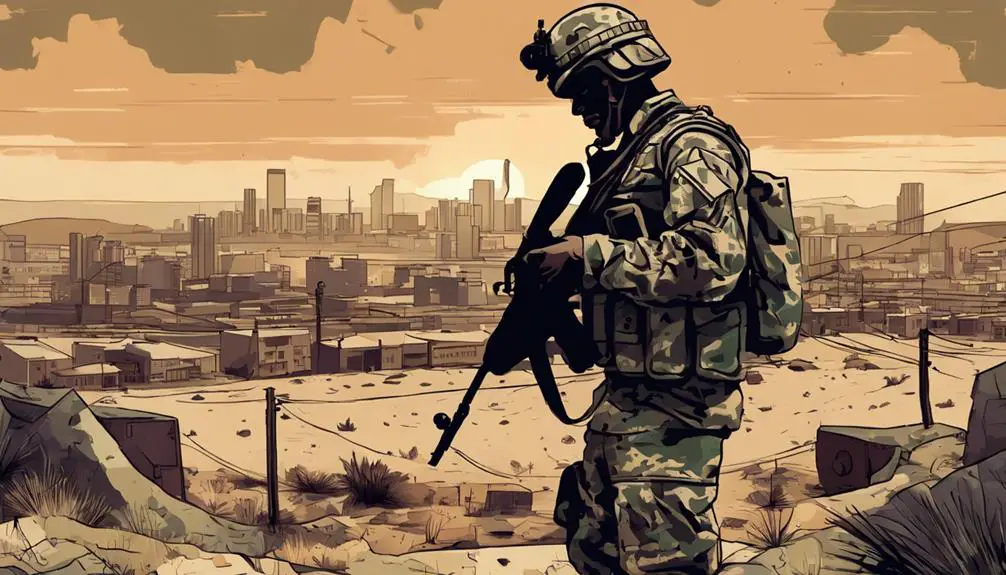When you're in the military, a "gig" isn't just a casual term – it's a serious mistake that can have real consequences. Getting a gig means you've messed up and could face disciplinary action or put your team's safety at risk. It's not just a slip-up; it's a failure that needs to be addressed. To avoid getting a gig, you need to understand what causes them and how to prevent them. From fumble analysis to screwup protocols, there are strategies to identify and learn from mistakes. As you explore the world of military slang, you'll uncover more about the importance of clear communication in high-pressure situations.
Origins of Military Slang
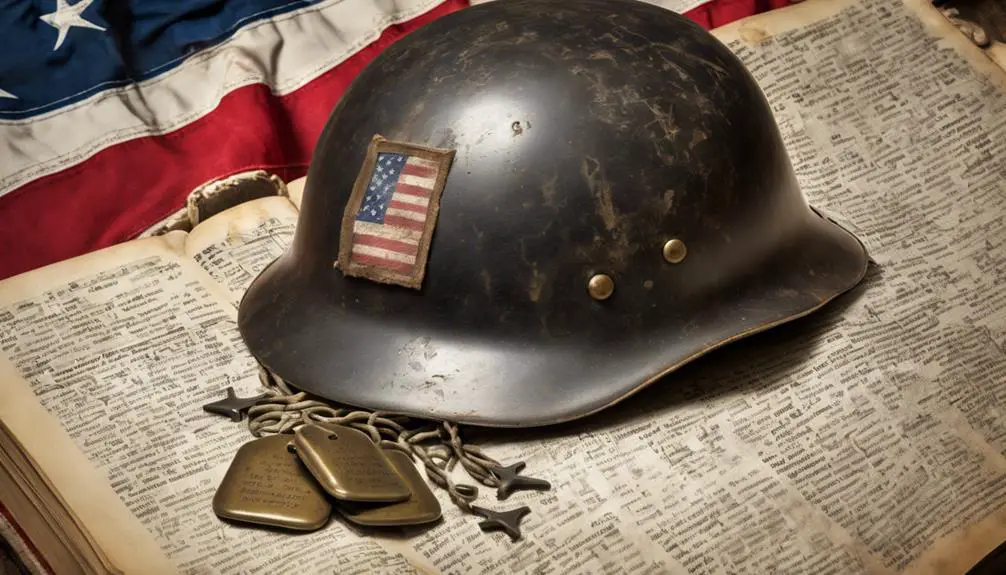
In the trenches of World War I, soldiers coined phrases like 'dugout' for trenches and 'blimp' for airships, marking the earliest recorded instances of military slang. You might wonder how these phrases came to be. The answer lies in the unique circumstances of war.
Soldiers from different regions and backgrounds were brought together, forcing them to explore their language to communicate effectively. This phenomenon is known as code switching, where individuals switch between different languages or dialects to accommodate their audience. In this case, soldiers created a distinct language that was easy to understand and allowed them to convey complex ideas quickly.
This language evolution was a natural response to the pressures of war, where clear communication was a matter of life and death. As you investigate the world of military slang, you'll notice how it reflects the dynamic and adaptive nature of language. It's a tribute to the human ability to create new ways of communicating in the face of adversity.
Gig: The Anatomy of a Screw-Up
You've probably heard the phrase 'gig' being thrown around in military circles, but what exactly does it mean when someone says you've gotten a gig? In military slang, a gig refers to a mistake or a screw-up, often resulting in consequences or disciplinary action. When you get a gig, it means you've committed an error that can't be ignored.
A gig can range from minor infractions, like showing up late to a briefing, to more serious mistakes, such as misplacing classified documents. Whatever the case, getting a gig means you've failed to meet expectations, and it's time to face the music.
To mitigate the damage, military personnel undergo Fumble Analysis, a process that identifies the root cause of the mistake and implements corrective measures to prevent future occurrences.
In extreme cases, Screwup Protocols may be initiated, which involve a thorough investigation and potential disciplinary action. The goal is to learn from the mistake and move forward, ensuring that the gig doesn't happen again.
Military Lingo 101
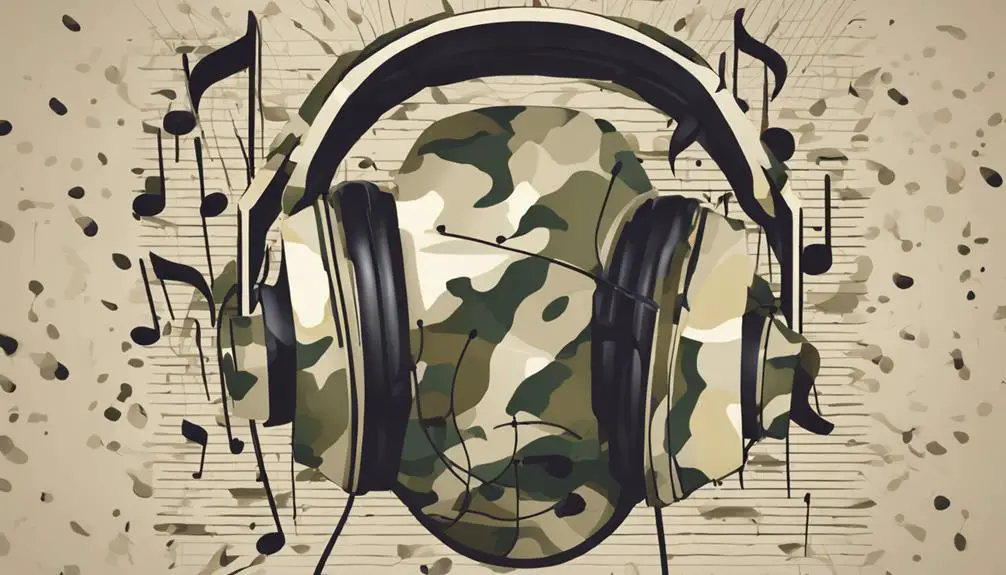
Mastering military lingo requires familiarity with a unique vocabulary, where everyday words take on new meanings. You'll need to learn the nuances of military slang to communicate effectively with your comrades. The evolution of military lingo is a fascinating process, shaped by the need for brevity, clarity, and secrecy. Over time, words and phrases are adapted, modified, or invented to suit the military's distinct cultural context.
As you immerse yourself in military culture, you'll find that code switching is an essential skill. You'll need to seamlessly shift between formal, technical language and informal, colloquial slang. This adaptability is critical in high-pressure situations, where clear communication can be a matter of life and death.
Coping Mechanisms in Combat
When bullets start flying, your mental and emotional resilience becomes an essential component of survival, as the psychological toll of combat can be just as debilitating as any physical wound. You're not just fighting for your life, but also for your sanity.
Battle fatigue, a state of extreme physical and mental exhaustion, can creep up on you, making it difficult to stay focused and alert. The constant exposure to traumatic events can lead to moral injury, a deep sense of guilt, shame, or regret that can haunt you long after the battle is over.
To cope with the stresses of combat, you need effective coping mechanisms. This might involve developing a strong support network among your unit, engaging in stress-reducing activities like meditation or exercise, or finding healthy ways to express emotions like writing or talking to a trusted friend.
It's important to acknowledge the emotional toll of combat and prioritize your mental health. By doing so, you can build resilience, reduce the risk of battle fatigue and moral injury, and stay mission-ready. Remember, taking care of your mental health is just as important as taking care of your physical health.
Slang as a Cultural Glue
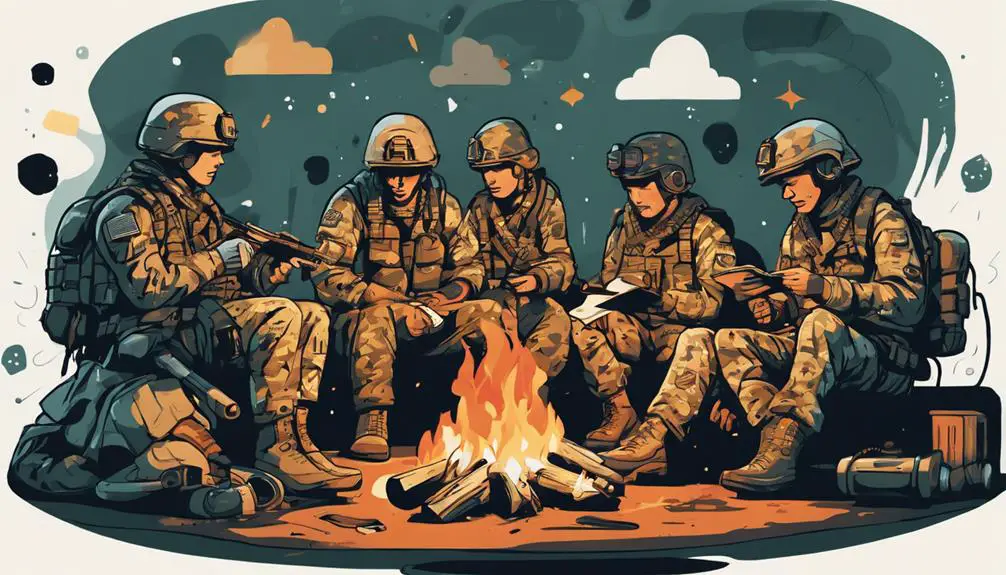
In the high-stress environment of combat, slang emerges as a cultural glue that binds military personnel together, fostering a sense of camaraderie and shared identity. As you navigate the complexities of military life, you'll find that slang plays an essential role in shaping your cultural identity. It's a way to connect with fellow service members, share experiences, and create a sense of belonging.
| Slang Term | Meaning |
|---|---|
| FNG | Freaking New Guy (rookie) |
| Hooah | Expression of enthusiasm or approval |
| Squared Away | Well-organized and efficient |
| Bravo Zulu | Well done or good job |
| Got Your Six | Watching your back or having your trust |
In this context, slang serves as a social bonding agent, bridging the gaps between individuals from diverse backgrounds. By adopting this unique language, you're signaling to others that you're part of the military community. This shared cultural identity strengthens social bonds, fostering a sense of trust and unity among troops. As you adopt military slang, you'll find that it becomes an integral part of your identity, helping you navigate the challenges of military life.
Decoding Military Jargon
As you explore the world of military jargon, you'll encounter a unique linguistic landscape that can be both fascinating and intimidating, requiring a decoder's mindset to navigate its complexities. Decoding military jargon is a code-cracking endeavor, where understanding the nuances of language can mean the difference between success and failure.
To overcome language barriers, it's important to recognize that military jargon is a distinct dialect, shaped by the unique culture and experiences of the military community. Here are a few key aspects to keep in mind:
- Context is key: Understanding the context in which a term is used is vital to deciphering its meaning.
- Acronyms abound: Military jargon is replete with acronyms, which can be confusing, but are often necessary to understanding a message.
- Slang evolves: Military slang isn't static; it evolves over time, reflecting changes in technology, tactics, and cultural trends.
- Code-switching is common: Military personnel often switch between formal and informal language, depending on the situation, making it important to recognize when to use formal language and when to use colloquialisms.
Lost in Translation: Civilian Life
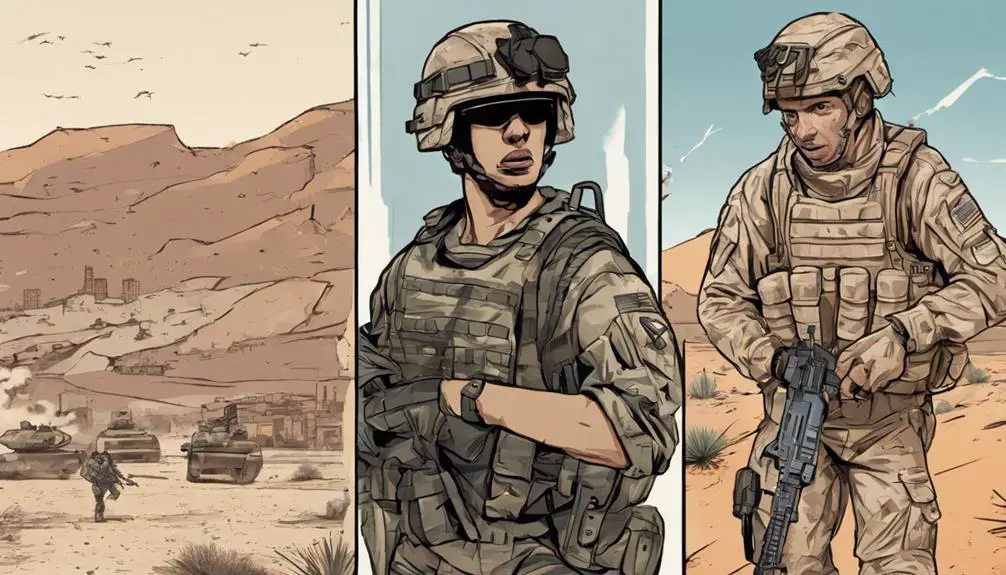
You've mastered the nuances of military jargon, but now it's time to confront the challenges of reentering civilian life, where familiar words and phrases can take on vastly different meanings. As you navigate this new terrain, you may experience cultural shock and struggle to make civilian adjustments. Everyday conversations can become confusing, and even simple phrases can be misinterpreted.
| Military Term | Civilian Equivalent | Meaning Shift |
|---|---|---|
| 'Roger that' | 'Got it' | From confirmation to casual acknowledgement |
| 'Drop your pack' | 'Take a break' | From literal action to figurative relaxation |
| 'Gear up' | 'Get ready' | From preparation for combat to general preparation |
In the military, 'Roger that' confirms receipt of an order, but in civilian life, it's a casual way of saying 'got it.' Similarly, 'drop your pack' goes from a literal action to a figurative break, and 'gear up' shifts from preparation for combat to general preparation. As you move into civilian life, being aware of these linguistic nuances can help you avoid misunderstandings and navigate everyday conversations with confidence.
Frequently Asked Questions
Can Military Slang Be Used in Formal Military Communications?
When you're communicating in a military setting, you might wonder if military slang has a place in formal messages. The answer is no, you shouldn't use slang in formal military communications.
Formal protocol dictates that official language is used to guarantee clarity and precision. Official language is essential in military communications, where accuracy and clarity are vital.
Stick to standard language to avoid misinterpretation and maintain professionalism.
Are Military Slang Terms Used Universally Across All Branches?
You might think that military slang terms are used universally across all branches, but that's not the case. Branch differences and service variations play a significant role in shaping the slang used within each branch.
What's common in the Army mightn't be familiar to Navy personnel, and the Air Force has its own unique lingo. While some terms might overlap, each branch has its distinct culture and terminology, making universal usage unlikely.
Do Military Slang Terms Have Official Dictionary Definitions?
You venture into the domain of military slang, where terms evolve like a chameleon adapting to its environment.
Do these terms have official dictionary definitions? The answer is, it's a mixed bag.
While some terms, like 'gig,' have etymological roots in naval slang, others, like 'FUBAR,' have been absorbed into mainstream language without formal definitions.
Lexical evolution is a natural process, and military slang is no exception.
Can Civilians Use Military Slang Without Offending Veterans?
When using military slang, you might wonder if you'll offend veterans. Be mindful of cultural appropriation and veteran sensitivity. Using military terms without understanding their context or significance can come across as disrespectful.
However, if you're genuinely interested in the culture and respectful of its origins, using military slang can be a way to connect with veterans and show appreciation. Just be aware of your intentions and the potential impact of your words.
Are There Any Military Slang Terms That Are Now Obsolete?
You're wondering if military slang terms have fallen out of use.
Yes, many have. Forgotten phrases and lost lingo litter the history of military communication. As language evolves, old terms are replaced by new ones.
You'll find few veterans still using 'buddy system' or 'foxhole radio.' Even 'rear echelon' has given way to more modern expressions.
As military operations adapt, so does its language, leaving behind a trail of obsolete terms.
Conclusion
As you reflect on the world of military slang, remember that one in five veterans struggles to adjust to civilian life.
The phrase 'a gig' may evoke laughter, but the reality is that military jargon serves as a coping mechanism in the face of chaos.
As you navigate the complexities of military lingo, recall that behind every 'gig' is a story of camaraderie, sacrifice, and resilience.

